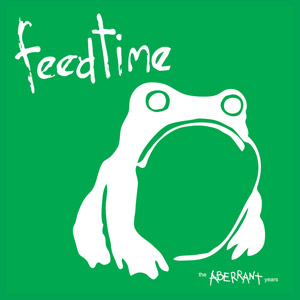
The Aberrant Years
Sub Pop
Australia always seems to get short shrift when it comes to discussions of music, particularly when it comes to the early days of punk and post-punk. Perhaps it’s just a factor of geography or maybe it’s just misplaced nationalism. Despite the fact that Australia has contributed to the cannon (Radio Birdman and The Birthday Party, for example), it’s either the runner-up or not in the conversation. So for an underground Australian band to break out past the shore was damn near a miracle, and anything else fell into the dustbin of American music knowledge. As a result, it’s no surprise that the name Feedtime may not ring any bells. But what is surprising is how far this subterranean band actually did reach. They recorded for local label Aberrant, but were distributed worldwide by Rough Trade, and their final record before they broke up was produced by soon to become super-producer Butch Vig. And while none of that changed their fortunes, it did gain them a dedicated network of fans, in particular much of the early roster of the venerable Sub Pop. So it makes sense that Sub Pop has decided to reissue Feedtime’s discography as a boxset titled The Aberrant Years.
As advertised, the boxset collects everything Feedtime released while they were on Aberrant. (They reunited briefly in 1996 to release Billy on Amphetamine Reptile.) The set includes all four records—Feedtime, Shovel, covers album Cooper S, and Suction—as well as all their singles for a total of 65 songs. For a band that prolific, it’s weird that not one song broke through. Then you push play and it becomes clear.
There’s no way that anyone then, or even now, would know what to do with Feedtime. The band was anti-glamour and all business. Their brutal sound is blues, rock and country taken out back and having the snot beat of it. The closest comparison is X, but by comparison early X records are damn near prog rock. Driven by Al’s insistent bass, anchored by Tom’s no frills drums and ignited by Rick’s primitive guitar playing (no last names with this band), it’s a white-knuckled ride. But when they do lighten up on songs like “Clowns,” it’s almost like the sun has come out. It also shows that it’s not just loud sonics; there are actually songs underpinning the whole thing. And as strong as Feedtime’s own material is, it’s startling what they do when they cover songs, so totally recasting them that they seem like originals.
What The Aberrant Years does best is present the music in chronological order and gets out of the way so the listener can hear how Feedtime progressed. There’s a distinct difference between the first album and the last, but taken as a whole body of work, the set makes sense because you can see how they got there. And if the idea of a reissue automatically triggers ideas of remastering and pristine sound, then this set will be a shock. With the exception of Suction, which is still pretty raw, the songs sound like they’re playing on cassette and coming out of a boombox that’s beat to hell in the best possible way. While this boxset won’t singlehandedly put Australia back on the top tier of punk discussions, it does accomplish two important things. One, it revives and reintroduces Feedtime. And secondly, it raises the question, what else has the world missed?
Dorian S. Ham
PAST PERFECTS
Tronics, Love Backed By Force
Archers of Loaf, Vee Vee
Metal Dance
Giant Single: The Profile Records Rap Anthology
Karen Dalton, 1966
Mighty Sparrow, Sparrowmania! Wit, Wisdom and Soul from the King of Calypso 1962-1974
Gaunt, I Can See Your Mom from Here
Alex Chilton, Free Again: The "1970" Sessions
The Lucy Show, Remembrances
Boddie Recording Company: Cleveland, Ohio
Smashing Pumpkins, Gish and Siamese Dream
U2, Achtung Baby
Can, Tago Mago
Leonard Cohen, The Complete Albums Collection
